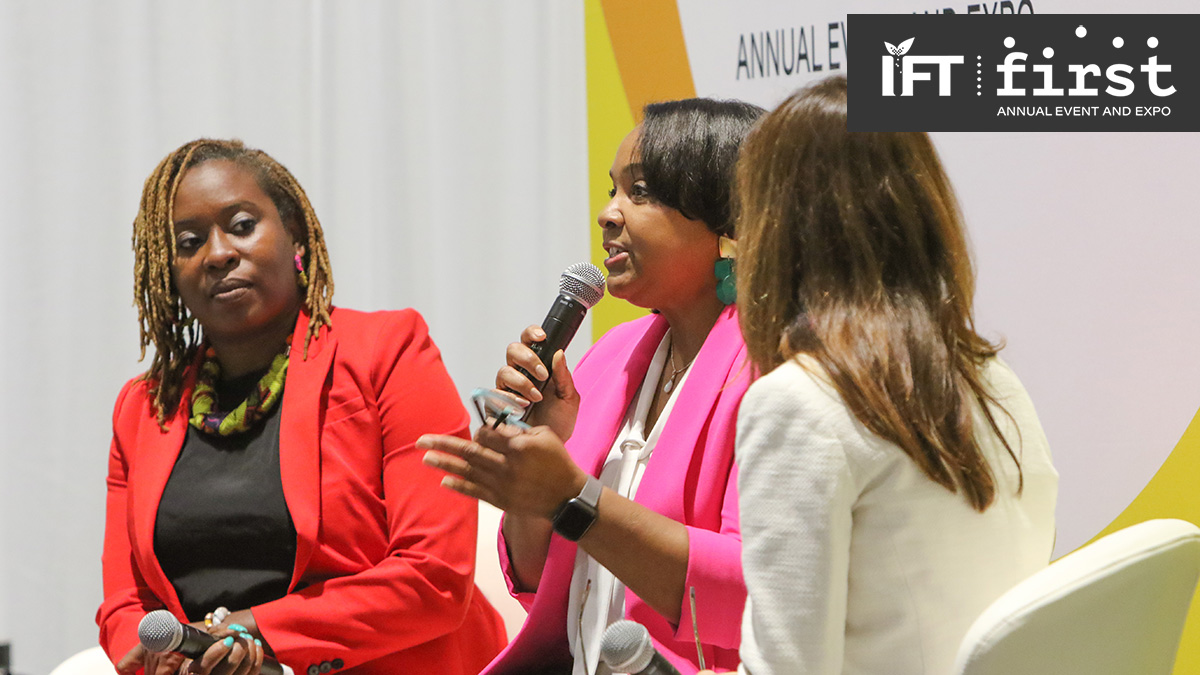Diversity, Equity, and Inclusion are More than Buzzwords
When it comes to diversity, equity, and inclusion, actions speak louder than words, according to the panelists who participated in a Business FIRST session on the first day of IFT FIRST.
 When it comes to diversity, equity and inclusion, actions speak louder than words, according to the panelists who participated in Monday’s session, “State of The Profession (Part 2): Unlocking Excellence through Inclusion in a Diverse Team.”
When it comes to diversity, equity and inclusion, actions speak louder than words, according to the panelists who participated in Monday’s session, “State of The Profession (Part 2): Unlocking Excellence through Inclusion in a Diverse Team.”
Panelists Kristen Anderson, vice chair at European Women on Boards and former chief DEI Officer at Barilla, Carla Kupe, gender and racial equity program director at YWCA, and Sherri Dublin, vice president, DEI, culture and communications at Ingredion Inc., told FIRST attendees that it was not enough to compile survey responses; DE&I initiatives must be embedded in corporate culture.
“The best practices are to listen in all levels: listen via surveys, listen via focus [groups]…get some numbers,” Anderson said. “Then, you’ve got to do something with it. People want to see actions; they want to see improvements.”
Instead of focusing on one thing, Anderson suggested mobilizing multiple levers to make people feel listened to and included. “If this was an easy business problem, we would've all solved diversity and DEI many years ago,” she added.
“Solving” DE&I is top of mind for companies, especially during the Great Resignation.
Kupe noted that many companies don’t conduct exit interviews to capture the reasons people are leaving, which could be related to a lack of DE&I in the workplace.
“In our talks with folks in the affinity groups and [employee resource groups] and so forth, it's usually a culture where things like microaggressions going unaddressed [that leads employees to quit,” Kupe explained. “Most workplaces only jump in if there's a big disciplinary issue, but not all the things leading up to it.”
The panelists agreed that the pandemic shone a lens on these issues and highlighted the importance of DE&I in the workplace.
Dublin noted that studies showed that workers who were Black, Indigenous or People of Color (BIPOC) preferred virtual work because it freed them from the microaggressions experienced in the workplace. The experience, she adds, should move companies toward action.
“The strategy is around having conversations with your employees and hearing from them … and not judging and making sure that [the] organization has policies and practices that are equitable when it comes to performance [and] hiring practices [and] where you really have to lean in and say, ‘is my organization adopting best practices?’” said Dublin.
The panelists acknowledge that changing culture and incorporating DE&I practices in the food industry will take time. Anderson believes success lies in taking a scientific approach and tackling it like a business problem with metrics, accountability, and plans.
“You wouldn't have a big project to launch a $10 million new pasta line and not have [key performance indicators] and not have accountability and deliverables—and that's the exact same way it should be with diversity, equity, and inclusion,” said Anderson. “It's a matter of really focusing on the progress, the steps, and thinking along the way about where bias could come into play.”
Dublin echoed the concept of treating DE&I as a business issue that requires gathering data, assessing information, and building an action plan to address gaps with people, policies, and programs, as the essential elements for tackling the issue. Her message: Putting DE&I front and center in an organization is essential for change to occur.
“Diversity, equity, and inclusion cannot be something that's considered a sidebar,” said Dublin. “If we were to approach it [like a business issue], then I think we could see an acceleration and including all the voices around the representation in the food science industry.”
Food Technology Articles

Feeding the World Through Science
Christopher R. Daubert reflects on the importance of raising awareness of the science of food discipline.

Beyond the Bench: Building Business Skills Into Food Science Curricula
College and university food science programs are evolving to prepare students for the workplaces of today and tomorrow by bridging the gaps between science and business knowledge.

Investing in African Heritage Foods
Foods from the African continent, such as millet and hibiscus, are starting to trend in Western diets. WANDA cofounder Tambra Raye Stevenson says that these foods could help solve the nutrition crisis.

Finding Joy in Lifelong Learning
IFT President Sean J. Leighton reflects on the importance of continuous learning.

‘Tis the Season for Trend Watching
IFT President 2023–2024 Sean Leighton and three IFT members share their thoughts on key trends for the year ahead.
Recent Brain Food

Celebrating Black Excellence at Home and Abroad
To kick off Black History Month, two members of IFT’s Member Resource Groups share their stories as food scientists in the African diaspora and how success motivates them to give back.
IFT Helps Young Innovators Excel in Their Careers
Amid mounting innovation pressures, a unique primer offers guidance for those new to food and beverage product development.
Building the Food Science Talent Pipeline
Support for IFT's Feeding Tomorrow Fund helps attract, retain, and celebrate the food scientists of the future.
Celebrating Pride Month with Leaders of IFT's Newest Member Resource Group
Hear from volunteers who head the IFT Proud Resource Group about how it connects and supports the LGBTQIA+ community within the science of food.
IFT Honors Asian American, Native Hawaiian, and Pacific Islander Heritage Month
Read about three IFT member volunteers who exemplify the remarkable contributions this diverse community brings.
